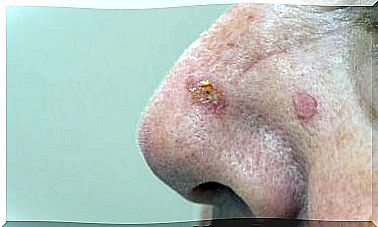8 Symptoms That Warn Of A Vitamin C Deficiency
Ascorbic acid or vitamin C is a nutrient that participates in several processes, such as the production of collagen for example. This is partly why it is reputed to be a nutrient beneficial to health.

A vitamin C deficiency can be a health problem for a number of reasons. It is no secret to anyone that vitamins play a fundamental role in everything that has to do with the health and proper functioning of the body. Among these, vitamin C is one of the best known and most important.
This nutrient is essential for the health of all body systems and it is proven that –in rodents– its regular consumption contributes to the production of collagen, the absorption of iron, the reduction of oxidative stress, among other processes.
Symptoms of vitamin C deficiency
For all the above, its deficiency in the body can trigger a series of negative reactions that directly affect the physical and mental state.
Although at first it may be difficult to notice it, with the passage of time some symptoms appear that make it evident. Keep them in mind so that you go to your doctor in time for an evaluation.
1. Weakening and hair loss

Hair thinning and loss are often associated with multiple factors that can damage the hair root.
Vitamin C deficiency is a common cause, as it is an essential nutrient for maintaining collagen and proteins that give you strength. Therefore, a diet poor in foods that contain this vitamin can cause dryness, hair loss and susceptibility to dandruff.
2. Recurrent infections
People with a vitamin C deficiency tend to develop more infections. This is counteracted by giving an extra contribution in the diet.
According to experts from the National Institutes of Health, this nutrient is essential for the body’s defense mechanisms and, therefore, a decrease in its levels reduces its ability to destroy pathogens that cause all kinds of diseases.
Continuous urinary infections or oral problems can be signs that indicate that you should increase your consumption.
3. Mood swings

Although most of us ignore it, this vitamin also has a close link with emotional health.
According to hypotheses, when there are adequate levels of this vitamin in the body, there is mental stability, tranquility and control over hormones. The latter are largely responsible for the emotional state.
It is considered that a deficiency of vitamin C in the body can cause irritability, stress and other negative conditions that affect daily life.
4. Chronic fatigue, a symptom of vitamin C deficiency
Indirectly, chronic fatigue and continuous feeling of tiredness can be symptoms of scurvy, a serious health problem that is related to vitamin C deficiency and requires immediate medical treatment.
On the other hand, in a recent study, it is suggested that perhaps oxidative stress is one of the causes involved in the development of mood disorders (such as depression and anxiety), chronic fatigue, among others; and therefore, it is considered that vitamin C supplements (and other antioxidants) could contribute to the treatment of these types of problems.
5. Wounds that heal with difficulty
Since this nutrient is necessary for proper oxygenation and cell repair, its decrease in the body prevents wounds from healing normally.
It is common for superficial injuries to take longer to heal and bruises to appear overnight.
6. Pain

Experiencing general pain, all over the body frequently, is a symptom that there is something that needs to be evaluated and properly cared for by the doctor. Especially if it is intense, it prevents a normal life and is accompanied by other symptoms.
Nutritional deficiencies can cause a person to feel general pain throughout their entire body or, rather, at the muscle and joint level.
For example, a lack of vitamin C decreases the proper absorption of some minerals, which leads to muscle weakness. In addition, it prevents the correct synthesis of collagen and causes a weakening of the cartilage that protects the joints.
7. Dry skin
Daily intake of vitamin C is one of the best habits for smooth, beautiful, disease-free skin.
This nutrient prevents the early loss of collagen and elastin. These two substances are responsible for maintaining the firmness and elasticity of the skin.
8. Cardiovascular diseases
Cardiovascular disease and heart problems can develop from multiple factors. And in relation to this, there is the hypothesis that its early appearance may have something to do with the lack of vitamin C in the diet.
According to a recent study, its antioxidant action helps maintain cardiovascular health and reduce the risk of developing diseases, as well as maintaining normal cholesterol and glucose levels. In addition, vitamin C is essential for tissues and blood vessels.
Do you think you are lacking some vitamin C?
Do you suspect this nutritional deficiency? Find out about the natural sources that contain it and try to improve your eating habits to receive the correct dose.
And never forget to consult a medical professional to do the relevant tests and offer the most appropriate treatment for your case.









